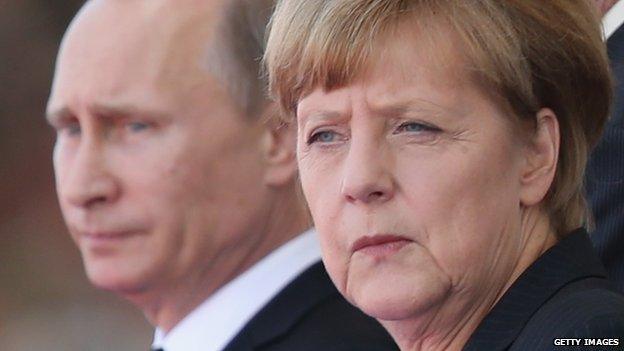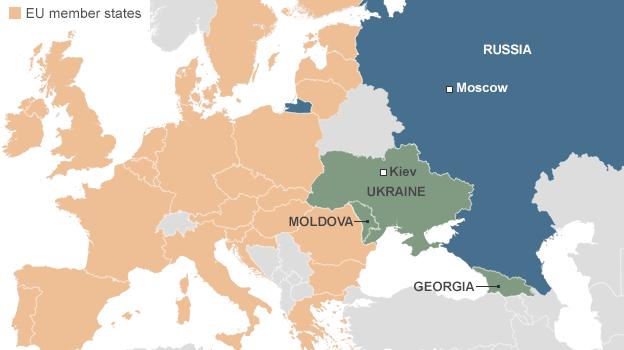Merkel condemns Russia 'interfering' in Eastern Europe
- Published

Russian President Vladimir Putin with German Chancellor Angela Merkel: ties between the two countries have been strained by the Ukraine crisis
German Chancellor Angela Merkel has accused Russia of interfering in the affairs of Eastern European countries seeking closer ties with the EU.
In an interview in Die Welt am Sonntag, external newspaper (in German), Mrs Merkel said Russia was "creating problems" for Moldova, Georgia and Ukraine.
Russia's violation of "the territorial integrity... of Ukraine must not be allowed to stand", she added.
Moldova, Georgia and Ukraine have signed trade deals with the EU.
Russia is suspicious of these association agreements - it is trying to draw republics which were once part of the Soviet Union into its own customs union.

"Moldova, Georgia and Ukraine are three countries in our eastern neighbourhood that have taken sovereign decisions to sign an association agreement with the EU," Mrs Merkel told Germany's Die Welt am Sonntag.
"Russia is creating problems for all three of these countries," she said, pointing to frozen conflicts in breakaway regions like Trans-Dniester, Abkhazia and South Ossetia, as well as Russian actions in eastern Ukraine.
Last month Russian President Vladimir Putin signed a "strategic partnership" agreement with Georgia's breakaway region of Abkhazia, drawing strong criticism from Nato and the EU.
Correct response
In the interview, Mrs Merkel also accused Moscow of trying to make countries in the western Balkans economically and politically dependent on Russia in order to gain influence there.
She said she was "convinced" that the "common European response to Russia's actions is correct".
The Ukraine crisis began a year ago, when then-President Viktor Yanukovych abandoned an agreement on strengthening trade ties with EU in favour of closer co-operation with Russia.
This decision sparked pro-EU protests in the capital Kiev, eventually toppling Mr Yanukovych in February.
In the weeks that followed, Russia annexed Crimea, in Ukraine's south, and pro-Russian separatists took control of Donetsk and Luhansk, declaring independence.
More than 4,300 people have died and almost one million have been displaced since conflict began in April, the UN says.
The crisis has caused a serious rift between Russia and Ukraine's Western supporters.